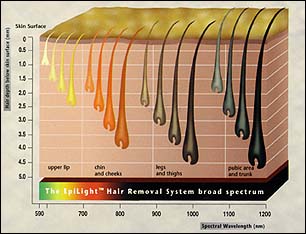Laser / Skin Resurfacing

Laser Skin Resurfacing
Human hairs are made up of three distinct parts: the bulb at the base of the hair follicle which produces hair, the shaft and the hair. The bulb and shaft are embedded within the skin, leaving only the hair visible to the naked eye. To remove unwanted hair on a long-term basis, it is necessary to destroy the hair follicle and its germinating centers that are in the bulb
- Removal of unwanted body hair is of major importance to most women and to increasing numbers of men who spend tremendous sums of money and invest much time and energy in pursuit of this smooth look.
- Over 80 million women use depilatories, epilators, waxing or shaving kits on a regular basis spending an estimated $500-600 million annually.
- Most unwanted hair, however, is an aesthetic concern rather than medical condition
- In the past few years, lasers and intense pulsed light systems have gained widespread acceptance as the most convenient long-term hair removal method. Intense light is converted into heat when it is absorbed in chromophores such as melanin. When light is absorbed in the follicle, shaft or bulb, it raises their temperature. Once the temperature reaches a high enough level in a hair follicle during its active phase, the targeted hair structures are critically damaged, hindering hair regrowth.
How does it work?
- When a pulse of light or a laser beam is delivered to the skin, you might experience a mild sting or pinch similar to the snap of a rubber band. No local anesthesia or pain medication is required.
- In contrast, shaving, waxing, and depilatory creams are all temporary methods that must be repeated on a regular basis.
- Electrolysis is a tedious, invasive, and painful process that involves inserting a needle into each hair follicle and delivering an electrical charge to destroy them one at a time.
- Electrolysis often requires years of treatments at regular intervals. So, in a few minutes, the doctor can effectively treat an area that would take over an hour with electrolysis.
How numerous treatments are required?
- This varies depending upon the hair color and location on the body. Several treatments might be needed, with each session lasting 10-30 minutes.
What are the side effects?
- Short-term side effects might include slight reddening of the skin or local swelling which might last a few days. In rare instances there might be some blistering.
After treatment, what are the restrictions on my activity after treatment?
- You can return to work the same day and resume all regular activities. You should limit sun exposure, which is always a good idea.
Who are candidates for treatment?
- Most people might be treated; however, check with your doctor. This might require a consultation visit
Procedures
- Anophthalmos
- Blepharoplasty
- Blepharospasm
- Brow Lift
- Congenital
- Dry Eye
- Eyelid Laxity
- Face
- Infections
- Inflammation
- Lacrimal System
- Lagophthalmos
- Latisse
- Locate an MD
- Orbital Tumors
- Ptosis
- Skin Rejuvenation
- Skin Tumors
- Symblepharon
- Thyroid Eye Disease
- Trauma
